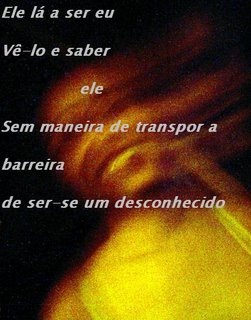Todo amor es fantasía;
él inventa el año, el día,
la hora y su melodía;
inventa el amante y, más,
la amada. No prueba nada,
contra el amor, que la amada
no haya existido jamás.
Antonio Machado
17.11.06
2.10.06
---------Vale do Urtigosa---------------------------
 S. Pedro foi bondoso e concedeu uma manhã soalheira para aventuras no Vale do Urtigosa. A mãe natureza parece grávida e explode abóboras inchadas, castanhas luzidias, uvas a pingar açucar, bagas e cogumelos!
S. Pedro foi bondoso e concedeu uma manhã soalheira para aventuras no Vale do Urtigosa. A mãe natureza parece grávida e explode abóboras inchadas, castanhas luzidias, uvas a pingar açucar, bagas e cogumelos!29.9.06
-------- Afinal o que é? --------------------------
No sábado passado assisti a uma conferência no Porto dada pela monja Tsering Paldron sobre "Amor e apego". Se demorei quase uma semana a falar disto foi porque estive este tempo todo a pensar sobre o que ouvi e mesmo agora decidi que tenho primeiro de começar por falar na filosofia que está por trás de tudo.
Buddhism
The word comes from 'budhi', 'to awaken'. It has its origins about 2,500 years ago when Siddhartha Gotama, known as the Buddha, was himself awakened (enlightened). Buddhism goes beyond religion and is more of a philosophy or 'way of life'. The Buddhist path can be summed up as: (1) to lead a moral life,(2) to be mindful and aware of thoughts and actions, and(3) to develop wisdom and understanding. Buddhism explains a purpose to life, it provides a code of practice or way of life that leads to true "happiness". It also includes a deep understanding of the human mind which prominent psychologists around the world are now discovering to be both very advanced and effective.
The basic concepts in Buddhism can be summed up by the Four Noble Truths and the Noble Eightfold Path.
•The first truth is that life is suffering i.e., life includes pain, getting old, disease, and ultimately death. We also endure psychological suffering like loneliness frustration, fear, embarrassment, disappointment and anger. This is an irrefutable fact that cannot be denied. It is realistic rather than pessimistic because pessimism is expecting things to be bad. lnstead, Buddhism explains how suffering can be avoided and how we can be truly happy.
•The second truth is that suffering is caused by craving and aversion. We will suffer if we expect other people to conform to our expectation, if we want others to like us, if we do not get something we want,etc. In other words, getting what you want does not guarantee happiness. Rather than constantly struggling to get what you want, try to modify your wanting. Wanting deprives us of contentment and happiness.
•The third truth is that suffering can be overcome and happiness can be attained. lf we give up useless craving and learn to live each day at a time (not dwelling in the past or the imagined future) then we can become happy and free. We then have more time and energy to help others. •The fourth truth is that the Noble 8-fold Path is the path which leads to the end of suffering.
In summary, the Noble 8-fold Path is being moral (through what we say, do and our livelihood), focussing the mind on being fully aware of our thoughts and actions, and developing wisdom by understanding the Four Noble Truths and by developing compassion for others.
• The moral code within Buddhism is the precepts, of which the main five are: not to take the life of anything living, not to take anything not freely given, to abstain from sexual misconduct and sensual overindulgence, to refrain from untrue speech, and to avoid intoxication, that is, losing mindfulness.
• What is Karma?Karma is the law that every cause has an effect, i.e., our actions have results. This simple law explains a number of things: inequality in the world, why some are born handicapped and some gifted, why some live only a short life. Karma underlines the importance of all individuals being responsible for their past and present actions. How can we test the effect of our actions? The answer is summed up by looking at (1) the intention behind the action, (2) effects of the action on oneself, and (3) the effects on others.
• What is Wisdom?Buddhism teaches that wisdom should be developed with compassion. At one extreme, you could be a goodhearted fool and at the other extreme, you could attain knowledge without any emotion. Buddhism uses the middle path to develop both. The highest wisdom is seeing that in reality, all phenomena are incomplete, impermanent and do no constitute a fixed entity. True wisdom is not simply believing what we are told but instead experiencing and understanding truth and reality. Wisdom requires an open, objective, unbigoted mind. The Buddhist path requires courage, patience, flexibility and intelligence.
• What is Compassion?Compassion includes qualities of sharing, readiness to give comfort, sympathy, concern, caring. In Buddhism, we can really understand others, when we can really understand ourselves, through wisdom.
Buddhism
The word comes from 'budhi', 'to awaken'. It has its origins about 2,500 years ago when Siddhartha Gotama, known as the Buddha, was himself awakened (enlightened). Buddhism goes beyond religion and is more of a philosophy or 'way of life'. The Buddhist path can be summed up as: (1) to lead a moral life,(2) to be mindful and aware of thoughts and actions, and(3) to develop wisdom and understanding. Buddhism explains a purpose to life, it provides a code of practice or way of life that leads to true "happiness". It also includes a deep understanding of the human mind which prominent psychologists around the world are now discovering to be both very advanced and effective.
The basic concepts in Buddhism can be summed up by the Four Noble Truths and the Noble Eightfold Path.
•The first truth is that life is suffering i.e., life includes pain, getting old, disease, and ultimately death. We also endure psychological suffering like loneliness frustration, fear, embarrassment, disappointment and anger. This is an irrefutable fact that cannot be denied. It is realistic rather than pessimistic because pessimism is expecting things to be bad. lnstead, Buddhism explains how suffering can be avoided and how we can be truly happy.
•The second truth is that suffering is caused by craving and aversion. We will suffer if we expect other people to conform to our expectation, if we want others to like us, if we do not get something we want,etc. In other words, getting what you want does not guarantee happiness. Rather than constantly struggling to get what you want, try to modify your wanting. Wanting deprives us of contentment and happiness.
•The third truth is that suffering can be overcome and happiness can be attained. lf we give up useless craving and learn to live each day at a time (not dwelling in the past or the imagined future) then we can become happy and free. We then have more time and energy to help others. •The fourth truth is that the Noble 8-fold Path is the path which leads to the end of suffering.
In summary, the Noble 8-fold Path is being moral (through what we say, do and our livelihood), focussing the mind on being fully aware of our thoughts and actions, and developing wisdom by understanding the Four Noble Truths and by developing compassion for others.
• The moral code within Buddhism is the precepts, of which the main five are: not to take the life of anything living, not to take anything not freely given, to abstain from sexual misconduct and sensual overindulgence, to refrain from untrue speech, and to avoid intoxication, that is, losing mindfulness.
• What is Karma?Karma is the law that every cause has an effect, i.e., our actions have results. This simple law explains a number of things: inequality in the world, why some are born handicapped and some gifted, why some live only a short life. Karma underlines the importance of all individuals being responsible for their past and present actions. How can we test the effect of our actions? The answer is summed up by looking at (1) the intention behind the action, (2) effects of the action on oneself, and (3) the effects on others.
• What is Wisdom?Buddhism teaches that wisdom should be developed with compassion. At one extreme, you could be a goodhearted fool and at the other extreme, you could attain knowledge without any emotion. Buddhism uses the middle path to develop both. The highest wisdom is seeing that in reality, all phenomena are incomplete, impermanent and do no constitute a fixed entity. True wisdom is not simply believing what we are told but instead experiencing and understanding truth and reality. Wisdom requires an open, objective, unbigoted mind. The Buddhist path requires courage, patience, flexibility and intelligence.
• What is Compassion?Compassion includes qualities of sharing, readiness to give comfort, sympathy, concern, caring. In Buddhism, we can really understand others, when we can really understand ourselves, through wisdom.
24.9.06
-----------Semana Aromática---------------------


Foi um curso de plantas aromáticas e medicinais em Lisboa que me deu a imensa alegria de estar uma semana sem pensar na T-word e que além disso me permitiu passar uma semana inteira com a Ritinha e respectivo Filipinho! O resultado foi que além de uma semana muito aromática em todos os sentidos, pude matar saudades desta miúda e ainda ter um cheirinho desta multicultural capital com cinema ao ar livre com vista para o Tejo, Luzboa a tingir ruas de tons estranhos, tango na praça do Carmo...
----------Pik nik pik nik pik nik----------------


Quase a dizer adeus ao Verão, um piquenique num rio aqui perto. Com os pais e amigos dos pais para ser diferente. O apetite é maior ao ar livre e a sesta sabe melhor. O pequeno Diogo ainda a treinar os seus primeiros passos passa mais tempo no chão (ou em queda) do que em pé. Um paseio pelo rio leva-nos desde o emaranhado de silvas inicial até sítios silenciosos em que os fetos se espelham nas águas transparentes. Que lindo.
15.9.06
Angel-a
1.9.06
18.8.06
Roy the toxic boy
 Já conhecem estes cartoons do Tim Burton?
Já conhecem estes cartoons do Tim Burton?http://homepage.eircom.net/~sebulbac/burton/home.html
(Acho que a história de Roy the toxic boy ficava bem na primeira página da minha tese...)
Araços
26.7.06
Dr. Querelle
Parabéns para o meu menino Armando que já é doutor!! Foste lindo de ver. Continua a ser muito feliz, mesmo que isso implique pôr assim um oceano inteiro entre nós. Não resisti a espreitar para dentro da caixa de memórias para ver de onde raio tinha surgido esta ideia de fazer doutoramentos com nomes esquisitos. Sabes o que encontrei? Um banho de lama num charco em Montesinho onde era suposto procurarmos tritões...
18.6.06
Jantar de yoguis

A Vaninha não percebeu o conceito da coisa.... isso é para soprar, não é para equilibrar na cabeça mulé!!
Quando vier lá da Holanda o mano ensina-te tá?
Para além de terem tentado tocar didgeridoo (e no máximo terem conseguido soltar uns roncos que à primeira vista teriam uma natureza duvidosa) os amigos yoguis tb desenvolveram uma terapia chamada "mantra miau" que tem como objectivo deixar a malta com dores de barriga de tanto rir!! No final, (e a Sofia é a culpada porque trouxe o vinho) já estávamos tão taralhocos que ficámos histéricos com um desgraçado dum pirilampo que apareceu no jardim (parte verde da foto em baixo).... Muito pouco Zen, de facto!!

1.6.06
Uff!
Pensei que o nome do projecto onde trabalho, projecto MAMAS (managing agrochemicals in multi-use aquatic systems) era um tanto ou quanto estranho. Mas hoje descobri que o artigo que a Adriana Flores escreveu sobre níveis de esterases associados a tolerância à permetrina no mosquito Aedes aegyptis foi financiado por um projecto chamado CONACyT.
É sempre bom saber ;)
É sempre bom saber ;)
30.5.06
23.5.06
18.5.06
Tell me about the forest (you once called home)
 …
…For the wind cries of late
In the whispering grass
Our way of life is held
In the spinning wheels of chance
I believe in the ways of an older law
When we used to dance to a different drum
And we are changing our ways
Yes we are taking on different roads
Tell me more about the forest
That you once called home
For the wind cries of late
In the whispering leaves
…
DCD
15.5.06
A different sunday

É uma daquelas pessoas sem idade, chama-se Siri Datta e quando se olha para ela há algo sem dúvida especial. Depois passámos o dia a pôr frente a frente a nossa força física com a força mental, num limbo quase até às lágrimas e é incrível como nos surpreendemos, como as duas estão ligadas, como há recantos de nós que não fazíamos ideia que existem.
À noite vi o "Primavera,Verão, Outono, Inverno... e Primavera" e a viagem continou, não tanto pela história mas pela beleza; o desfecho deste dia tinha de ser assim... só comigo, a pensar nos outros... lá fora.
13.4.06
10.4.06
Ciência à espreita
24.3.06
Aqui fica uma crónica cultural, pouco usual no meio dos meus escritos, mas hoje apeteceu-me:
Foi mesmo lindo, arrepiante quase desesperante ouvir a voz de Maria Antónia Mendes (Naifa) gritar-nos bem lá do fundo do estômago, quase de uma maneira fatídica, que todo o amor do mundo não foi suficiente... comoveu às lágrimas.
O poema original completo é assim:
"Todo o amor do mundo não foi suficiente porque o amor não serve de nada. ficaram só
os papéis e a tristeza, ficou só a amargura e a cinza dos cigarros e da morte.
Os domingos e as noites que passámos a fazer planos não foram suficientes e foram
demasiados porque hoje são como o sangue no teu rosto, são como lágrimas.
Sei que nos amámos muito e um dia, quando já não te encontrar em cada instante, em cada hora, não irei negar isso. Não irei negar nunca que te amei, nem mesmo quando estiver deitado,
nu, sobre os lençóis de outra e ela me obrigar a dizer que a amo antes de a foder."
Foi mesmo lindo, arrepiante quase desesperante ouvir a voz de Maria Antónia Mendes (Naifa) gritar-nos bem lá do fundo do estômago, quase de uma maneira fatídica, que todo o amor do mundo não foi suficiente... comoveu às lágrimas.
O poema original completo é assim:
"Todo o amor do mundo não foi suficiente porque o amor não serve de nada. ficaram só
os papéis e a tristeza, ficou só a amargura e a cinza dos cigarros e da morte.
Os domingos e as noites que passámos a fazer planos não foram suficientes e foram
demasiados porque hoje são como o sangue no teu rosto, são como lágrimas.
Sei que nos amámos muito e um dia, quando já não te encontrar em cada instante, em cada hora, não irei negar isso. Não irei negar nunca que te amei, nem mesmo quando estiver deitado,
nu, sobre os lençóis de outra e ela me obrigar a dizer que a amo antes de a foder."
José Luís Peixoto
22.3.06
Spring, dancing and bird watching...

Só para dizer que esta última semana concentrou três acontecimentos muito very importants na vida de moi même, sendo elas nomeadamente:
The spring: o sol já não se põe atrás do prédio da frente, em vez disso entra-me pela janela, invade-me a sala e projecta o gato na parede mesmo ao meu lado!!! Olá Miau!

Dancing: daqui a pouco e infelizmente temo que sair para dançar comece a ser um evento que acontece com a mesma regularidade da primavera (!). Soube a pouco e ainda atiçou mais a vontade...
Bird-watching: para quem foi um dia sensibilizado por um qualquer curso de identificação de aves para as cores das asas, subtis formas de bicos, perfis de voo, cantos ou pormenores puculiares afins há-de ter sempre um prazer dificilmente compreendido pelos outros de sair para o campo com uns binóculos e um guia nas mãos.... mesmo em dias de chuva! Foi bom e as garças vermelhas já chegaram!
já chegaram!

Só para dizer que esta última semana concentrou três acontecimentos muito very importants na vida de moi même, sendo elas nomeadamente:
The spring: o sol já não se põe atrás do prédio da frente, em vez disso entra-me pela janela, invade-me a sala e projecta o gato na parede mesmo ao meu lado!!! Olá Miau!

Dancing: daqui a pouco e infelizmente temo que sair para dançar comece a ser um evento que acontece com a mesma regularidade da primavera (!). Soube a pouco e ainda atiçou mais a vontade...
Bird-watching: para quem foi um dia sensibilizado por um qualquer curso de identificação de aves para as cores das asas, subtis formas de bicos, perfis de voo, cantos ou pormenores puculiares afins há-de ter sempre um prazer dificilmente compreendido pelos outros de sair para o campo com uns binóculos e um guia nas mãos.... mesmo em dias de chuva! Foi bom e as garças vermelhas
 já chegaram!
já chegaram!20.3.06
1.2.06
Inhibition of cholinesterase has been widely used as a biomarker for OP and carbamate pesticides both in field and in laboratory conditions.Inhibition of Há frases das quais eu já estou farta!!!! cholinesterase has been widely used as a biomarker for OP and carbamate pesticides both in field and in laboratory conditions.Inhibition of cholinesterase has been widely used as a biomarker for OP and carbamate pesticides both in field and in laboratory conditions.
31.1.06
Pequenos atalhos para o outro lado
"Ser-se um esquecimento e não te olharia mais Um respirar suspenso
Um sono de anestesia para que não sinta, não acordaria para sempre...
O fundamental escapou-se ou nunca lá esteve,
Acho que nunca te ensinaram a olhar para o céu
Ou é possível recitar sem saber o que são estrelas?
Ou ...
À navalhada escrevi raiva no teu peito vezes sem conta
E de todas fico salpicada de sangue na cara e nos braços... até já lhe sei o sabor.
E tu não morres...
...
Se me encontrares na ponte, as palavras que sejam os capítulos do meio,
(atalhos para o fim que o enredo vai longo demais)
Que os nossos olhos nos olhos sejam a última cena... mesmo que um passe para o outro lado ...
e o outro volte para trás. "
"Ser-se um esquecimento e não te olharia mais Um respirar suspenso
Um sono de anestesia para que não sinta, não acordaria para sempre...
O fundamental escapou-se ou nunca lá esteve,
Acho que nunca te ensinaram a olhar para o céu
Ou é possível recitar sem saber o que são estrelas?
Ou ...
À navalhada escrevi raiva no teu peito vezes sem conta
E de todas fico salpicada de sangue na cara e nos braços... até já lhe sei o sabor.
E tu não morres...
...
Se me encontrares na ponte, as palavras que sejam os capítulos do meio,
(atalhos para o fim que o enredo vai longo demais)
Que os nossos olhos nos olhos sejam a última cena... mesmo que um passe para o outro lado ...
e o outro volte para trás. "
30.1.06
A vizinha
"Ela bateu à porta e eu abri e disse-lhe, “desculpa, deixa-me só baixar a música”. Ela com uma cara irada diz “pois, era isso, a música está altíssima”. Depois as feições mudam, desenha contornos de choro, ... começa a chorar e eu faço-a entrar, digo “vai para o meu quarto, é do lado direito”."
"Ela bateu à porta e eu abri e disse-lhe, “desculpa, deixa-me só baixar a música”. Ela com uma cara irada diz “pois, era isso, a música está altíssima”. Depois as feições mudam, desenha contornos de choro, ... começa a chorar e eu faço-a entrar, digo “vai para o meu quarto, é do lado direito”."
28.1.06
 Não consigo ser metade de mim
Não consigo ser metade de mim e tu sabes, a pena do nosso olhar
preso nesta corda cheia de nós cai no espaço vazio entre o tudo e o nada. Lembra-me o calor do teu corpo
medido com o meu,
sítios do meu amor que já não existem;
sobrou-nos um caleidoscópio de vidros partidos que rangem com os meus passos.
27.1.06
19.1.06
18.1.06
You are the fountain
11.1.06
Subscrever:
Comentários (Atom)






















